Thousands evacuate homes as fears of Israeli ground offensive grow in Gaza
Gaza Tribunal urges urgent armed international action to stop Israel’s “most lethal phase of genocide” in Gaza
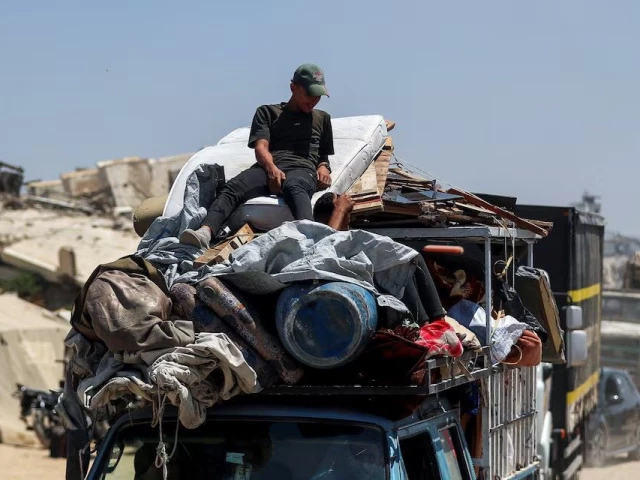
Fearing an imminent Israeli ground offensive, thousands of Palestinians have left their homes in eastern areas of Gaza City, now under constant Israeli bombardment, for points to the west and south of the shattered territory.
Israel's plan to seize control of Gaza City has stirred alarm abroad and at home where tens of thousands of Israelis held some of the largest protests seen since the war began, urging a deal to end the fighting and free the remaining 50 hostages held by Palestinian militants in Gaza.
The planned offensive has spurred Egyptian and Qatari ceasefire mediators to step up efforts in what a source familiar with the talks with Hamas militants in Cairo said could be "the last-ditch attempt."
Israeli Prime Minister Benjamin Netanyahu has described Gaza City as Hamas' last big urban bastion. But, with Israel already holding 75% of Gaza, the military has warned that expanding the offensive could endanger hostages still alive and draw troops into protracted and deadly guerrilla warfare.
Read More: Hamas rejects Israel's Gaza relocation plan
In Gaza City, many Palestinians have also been calling for protests soon to demand an end to a war that has demolished much of the territory and wrought a humanitarian disaster, and for Hamas to intensify talks to avert the Israeli ground offensive.
An Israeli armoured incursion into Gaza City could see the displacement of hundreds of thousands of people, many of whom have been uprooted multiple times earlier in the war.
Ahmed Mheisen, Palestinian shelter manager in Beit Lahiya, a war-devastated suburb abutting eastern Gaza City, said 995 families had departed the area in recent days for the south.
With the Israeli offensive looming, Mheisen put the number of tents needed for emergency shelter at 1.5 million, saying Israel had allowed only 120,000 tents into the territory during a January-March ceasefire.
The UN humanitarian office said last week 1.35 million people were already in need of emergency shelter items in Gaza.
"The people of Gaza City are like someone who received a death sentence and is awaiting execution," said Tamer Burai, a Gaza City businessman.
"I am moving my parents and my family to the south today or tomorrow. I can't risk losing any of them should there be a surprising invasion," he told Reuters via a chat app.
A protest is scheduled for Thursday in Gaza City by different unions, and people took to social media platforms vowing to participate, which will raise pressure on Hamas.
The last round of indirect ceasefire talks ended in late July in deadlock with the sides trading blame for its collapse.
Sources close to the Cairo talks said Egyptian and Qatari mediators had met with leaders of Hamas, allied militant group Islamic Jihad and other factions with little progress reported. Talks will continue on Monday, the sources added.
Hamas told mediators it was ready to resume talks about a U.S.-proposed 60-day truce and release of half the hostages, one official, who asked not to be named, told Reuters, but also for a wider deal that would end the war.
Diplomatic deadlock
Israel says it will agree to cease hostilities if all the hostages are released and Hamas lays down its arms - the latter demand publicly rejected by the Islamist group until a Palestinian state is established.
A Hamas official told Reuters on Monday the group continues to reject Israeli demands to disarm or expel its leaders from Gaza.
Gaps also appear to linger regarding the extent of an Israeli withdrawal from Gaza and how humanitarian aid will be delivered around the enclave, where malnutrition is rife and aid groups warn of unfolding famine.
On Saturday, the Israeli military said it was preparing to help equip Gazans with tents and other shelter equipment ahead of relocating them from combat zones to the south of the enclave. It did not provide further details on quantities or how long it would take to get the equipment into the enclave.
"Existing tents where people are living (in the south) have worn out and won't protect people against rainwater. There are no new tents in Gaza because of the Israeli restrictions on aid at the border crossings," Palestinian economist Mohammad Abu Jayyab told Reuters.
He said some Gaza City families had begun renting property and shelters in the south and moved in their belongings.
"Some people learned from previous experience, and they don't want to be taken by surprise. Also, some think it is better to move earlier to find a space," Abu Jayyab added.
The war began when Hamas-led militants stormed across the border into southern Israel on October 7, 2023, killing 1,200 people and taking 251 hostages back to Gaza, according to Israeli tallies.
More than 61,000 Palestinians have since been killed in Israel's ensuing air and ground war in Gaza, according to local health officials, with most of the 2.2 million population internally displaced.
Five more Palestinians have died of malnutrition and starvation in the past 24 hours, the Gaza health ministry said on Monday, raising the number of people who died of those causes to 263, including 112 children, since the war started.
Israel disputed the figures provided by the health ministry in the Hamas-run territory.
Gaza tribunal urges UN armed action to stop genocide
Former UN official Richard Falk warns in Istanbul that failure to act against Israel’s Gaza offensive would mark 'historic failure of humanity'
The Gaza Tribunal on Monday called for an urgent international armed intervention to stop what it described as Israel’s "most lethal phase of genocide" in Gaza, warning that failure to act would mark "an historic failure of humanity."
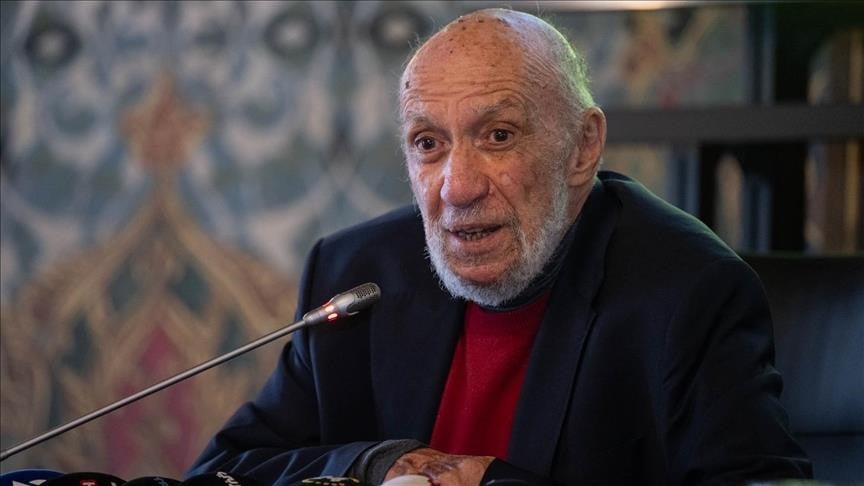
At a press conference in Istanbul, tribunal president Richard Falk urged governments to bypass the UN Security Council and let the General Assembly authorize armed intervention in Gaza. PHOTO: ANADOLU
At a press conference held in Istanbul, the president of the independent tribunal, Richard Falk, professor emeritus of international law at the US' Princeton University and the former UN special rapporteur on human rights in the Palestinian territories (2008–2014), urged governments to bypass the Security Council and empower the UN General Assembly to authorize armed intervention.
"If we do not take action of a serious and drastic kind at this time, anything done in a more moderate fashion will be too late, too late to save the surviving people who have already been traumatized by more than 22 months of genocide," Falk said.
"The eyes and the ears of the world have been exposed, as never before, including the Holocaust, to the transparency of genocide carried out in real time. It challenges our humanity."
Falk criticized Western democracies for what he called "complicit behavior," while noting shifts in public opinion.
"We are trying to address the conscience of all people and encourage the kind of activism that will produce changes in government ahead, particularly an arms embargo and various forms of sanctions … including the kind of solidarity with the Palestinian struggle that proved so effective in the anti-apartheid campaign," he said.
'Not only for Gaza but for well-being of the world'
Handed over to Anadolu, the tribunal’s emergency statement, titled Time to ACT: Mobilizing Against Israel’s Planned Conquest on Gaza City and Central Gaza, highlighted Israel’s Aug. 7 National Security Cabinet decision, which Falk said was "opposed by Israel’s own military high command," to press forward with the conquest of Gaza City, where nearly 1 million displaced Palestinians are sheltering.
"The imminent escalation deeply challenges member governments of the UN … to take drastic action now," Falk declared, citing legal pathways such as the 1950 Uniting for Peace Resolution and the Responsibility to Protect framework adopted at the UN’s 2005 summit.
Quoting Palestinian UN envoy Riyad Mansour’s appeal for immediate protection forces, the tribunal declared: "We, as the Gaza Tribunal, join with those who treat silence in the face of genocide as complicity."
Falk also condemned what he called systematic efforts to silence truth-telling. He pointed to sanctions against UN human rights rapporteurs and the "August 10th assassination of Assas al-Shafir and his Al Jazeera colleagues in another violent deliberate effort to silence truth tellers."
"Part of the Gaza Tribunal is to strengthen the role of truth or conceptions of reality. And that is of strategic importance not only for Gaza but for the well-being of the world," he added.
The tribunal is now preparing to raise the issue at the upcoming UN General Assembly in New York next month. "We hope to have laid the groundwork for doing that by the action of releasing this statement today," Falk said.
What is Gaza Tribunal?
The Gaza Tribunal was launched in London in November 2024 by nearly 100 academics, intellectuals, human rights advocates, and civil society figures, citing "the total failure of the organized international community to implement international law" in Gaza.
Since then, it has convened multiple sessions, including a February 2025 chamber meeting in London and a strategy gathering in the Turkish metropolis Istanbul to brief the international public.
In May, the tribunal held a four-day public session in Sarajevo, Bosnia, hearing testimony from witnesses, journalists, academics, and experts.
That session culminated in the Sarajevo Declaration, which formally accused Israel of genocide, war crimes, and apartheid.
There will be a final hearing in October in Istanbul, where the "Jury of Conscience will deliver a moral verdict based on all testimonies and evidence," noted another statement handed to Anadolu by the tribunal.
Palestinian PM: Interim body to govern Gaza after ceasefire
‘Gaza is an integral part of our state, and our government is the only executive body authorized to manage its affairs,’ Mohammad Mustafa says
An interim Palestinian committee will govern the Gaza Strip after a ceasefire is reached, Palestinian Prime Minister Mohammad Mustafa said on Monday.
“The Gaza Management Committee, which will be announced soon, is an interim committee under the authority of the Palestinian government,” Mustafa told a press conference with Egyptian Foreign Minister Badr Abdelatty at the Rafah border crossing with the Gaza Strip.
Also Read: 39 killed in Gaza as Israel expands offensive
“Gaza is an integral part of our state, and our government is the only executive body authorized to manage its affairs,” he added.
Mustafa stressed that the Israeli assault on Gaza “does not give any party, local or international, legitimacy to impose superior arrangements” on the enclave.
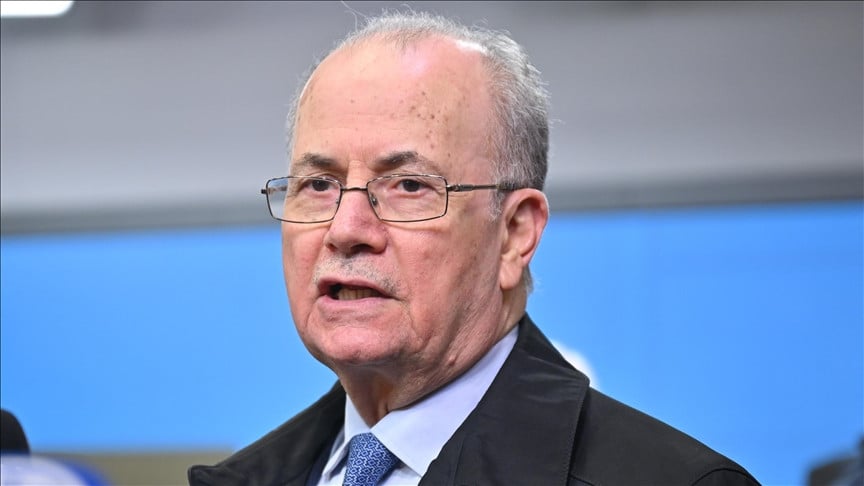
An interim Palestinian committee will govern the Gaza Strip after a ceasefire is reached, Palestinian Prime Minister Mohammad Mustafa said on Monday. PHOTO: ANADOLU
The premier said the Palestinian Authority is working with Egypt to prepare a conference for the reconstruction of Gaza “as soon as possible.”
Israel’s closure of the Rafah crossing to the entry of aid trucks into Gaza is “a message to the world that Israel is starving the Palestinian people to force their displacement,” Mustafa said.
On Aug. 8, the Israeli Security Cabinet approved Prime Minister Benjamin Netanyahu's proposal to gradually occupy the Gaza Strip, beginning with Gaza City.
The plan envisions the takeover of Gaza City by displacing nearly 1 million residents to the south, surrounding the city, and then carrying out raids into its neighborhoods. A second phase would involve retaking refugee camps in central Gaza, much of which has already been reduced to rubble.
Israel has killed more than 61,900 Palestinians in Gaza since October 2023. The military campaign has devastated the enclave and brought it to the verge of famine.
Last November, the International Criminal Court issued arrest warrants for Netanyahu and his former Defense Minister Yoav Gallant for war crimes and crimes against humanity in Gaza.
Israel also faces a genocide case at the International Court of Justice for its war on the enclave.


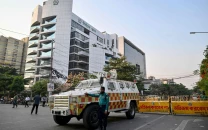
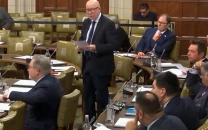

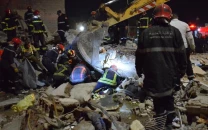

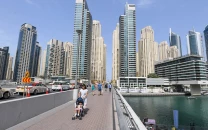












COMMENTS
Comments are moderated and generally will be posted if they are on-topic and not abusive.
For more information, please see our Comments FAQ